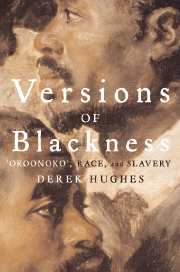Book contents
- Frontmatter
- Contents
- Introduction
- A Note on the Texts
- Chronology
- PART ONE THE MAJOR TEXTS
- PART TWO CONTEXTS: EUROPE, AMERICA, AND AFRICA
- DISCUSSIONS OF COLONIALISM
- Iewes in America
- Americans no Iewes
- Leviathan
- A Brief View and Survey of the Dangerous and Pernicious Errors to Church and State, in Mr. Hobbes's Book, entitled ‘Leviathan’
- Two Treatises of Government
- The Germantown Protest
- Bibliography
- Index
Americans no Iewes
Published online by Cambridge University Press: 05 June 2012
- Frontmatter
- Contents
- Introduction
- A Note on the Texts
- Chronology
- PART ONE THE MAJOR TEXTS
- PART TWO CONTEXTS: EUROPE, AMERICA, AND AFRICA
- DISCUSSIONS OF COLONIALISM
- Iewes in America
- Americans no Iewes
- Leviathan
- A Brief View and Survey of the Dangerous and Pernicious Errors to Church and State, in Mr. Hobbes's Book, entitled ‘Leviathan’
- Two Treatises of Government
- The Germantown Protest
- Bibliography
- Index
Summary
In pag. 55. the Author gives a little touch upon the jus and right of entring into, and setling in anothers land or dominion, wherein Acosta hath learnedly and elaborately handled that question, and Barthol. de las Casas, and sundry Civilians have travailed excellently herein; but I fear there is ever more of an inordinate desire of enlargement of wealth and dominion, than any warrant of Law or Religion to attain, and consequently offorce to maintain a possession, and to that end qui minor est armis is the ratio ultima, the ever finall result and resolution, and the ergo of the Syllogisme.
I know there are many Meanders and windings in this question of Plantation, and setling in anothers land; and if the Commandement Exod. 22.v.21. Thou shalt not oppresse a stranger, much lesse shalt thou (being a stranger) presume to oppresse another at his own home; and the counsell of not removing a Land-mark be well considered, we may find argument to help us; I doe but now peepe into this question, and may happily hereafter adventure to tread the maze of it; in the mean time we are not to forget what we have sometimes suffered by the natives in the West-Indies, for our invasion and usurpation upon them, and we are now become staffeholders of a first precarious interest, and begin to prescribe in intrusion, and an unprovoked conquest….
- Type
- Chapter
- Information
- Versions of BlacknessKey Texts on Slavery from the Seventeenth Century, pp. 358 - 359Publisher: Cambridge University PressPrint publication year: 2007



